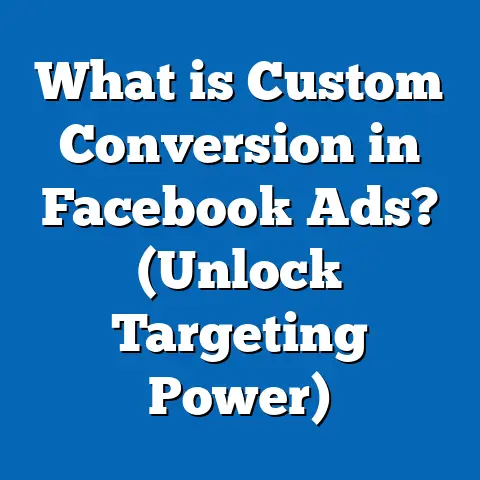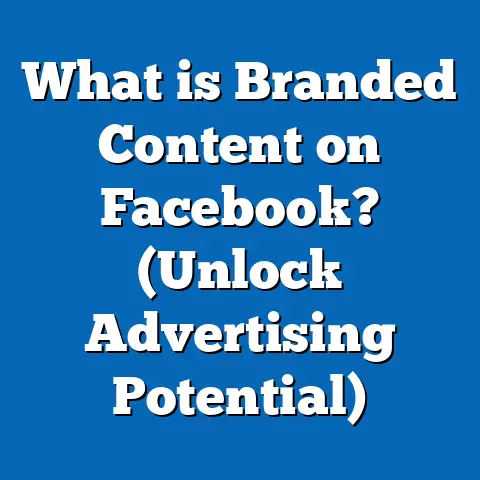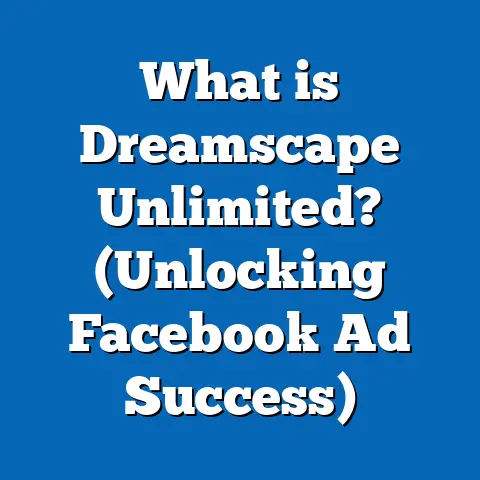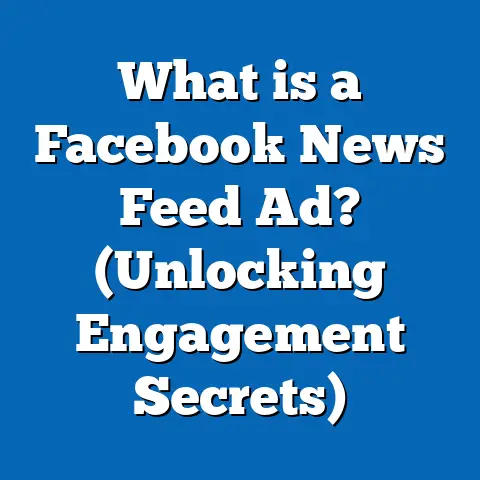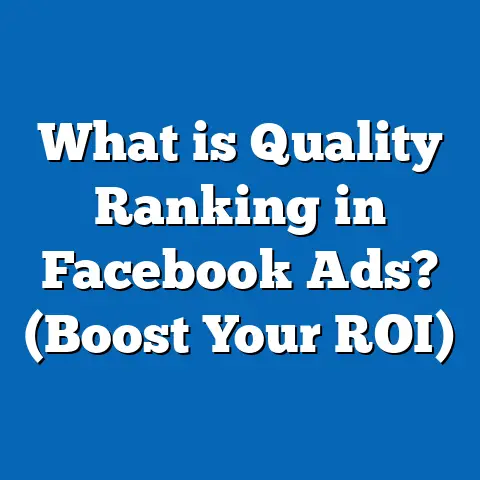What is a Facebook Ad Agency? (Unlocking Targeted Success)
What is a Facebook Ad Agency? (Unlocking Targeted Success)
Introduction: Tapping into Seasonal Trends for Maximum Impact
Business cycles are often punctuated by key seasonal moments—holidays, back-to-school periods, summer sales, Black Friday, or even industry-specific events.
These windows represent golden opportunities for marketers to capture heightened consumer interest.
However, competition intensifies during these times, making it critical not just to advertise but to advertise smartly.
Facebook, with its vast user base and sophisticated targeting tools, offers unmatched potential to reach consumers exactly when they are most receptive.
Yet, the platform’s complexity and rapid evolution pose significant challenges for businesses trying to manage campaigns internally.
This is where a Facebook Ad Agency becomes indispensable.
By harnessing expert knowledge, data-driven strategies, and creative prowess, these agencies help brands tap into seasonal surges and beyond—turning advertising budgets into measurable growth.
Understanding Facebook Ad Agencies: A Comprehensive Overview
What is a Facebook Ad Agency?
A Facebook Ad Agency is a marketing firm specializing exclusively in the creation, management, and optimization of advertisements on Facebook and its associated platforms such as Instagram, Messenger, and the Audience Network.
Unlike general digital marketing agencies that cover multiple channels, these agencies focus deeply on mastering Facebook’s advertising ecosystem.
Their core mission is to help businesses:
- Reach highly specific audiences.
- Increase engagement and conversions.
- Maximize return on ad spend (ROAS).
- Stay ahead of platform changes and trends.
Facebook Ad Agencies employ teams of strategists, data analysts, creative professionals, and media buyers who collectively design campaigns tailored to clients’ unique goals.
Why Businesses Choose Facebook Ad Agencies
Facebook advertising is not just about posting ads; it involves intricate strategy, constant testing, and ongoing optimization.
Here are core reasons why businesses turn to agencies:
- Platform Expertise: Facebook’s ad platform updates algorithms, policies, and features frequently.
Agencies stay current with these developments to maintain campaign effectiveness. - Resource Efficiency: Running complex ad campaigns requires specialized skills and time.
Agencies free up internal resources. - Access to Advanced Tools: Agencies often invest in premium analytics software and automation tools unavailable to most businesses.
- Creative Excellence: Producing high-quality video ads, carousel ads, or interactive formats requires creative teams.
- Data-Driven Decisions: Agencies rely heavily on performance data to refine audiences, creatives, and bidding strategies.
The Landscape of Facebook Advertising: Key Statistics
Understanding the scale and potential of Facebook advertising underscores the value agencies bring:
- 2.96 billion monthly active users globally use Facebook as of 2024 (Statista).
This massive audience covers nearly every demographic group. - Businesses spent over $138 billion on Facebook ads worldwide in 2023 (eMarketer), reflecting trust in the platform’s ROI potential.
- Average click-through rates (CTR) for Facebook ads hover around 0.9%, with conversion rates varying by industry between 9% and 10.5% (WordStream).
- Ads on Facebook reach approximately 70% of all internet users aged 18-65+ globally.
- Small businesses using Facebook ads report revenue growth averages of 20-25% within six months of optimized campaigns (Facebook Business Insights).
These numbers reveal the scale of opportunity but also the need for precision targeting and expert campaign management.
Core Services Offered by a Facebook Ad Agency
Facebook Ad Agencies offer a suite of specialized services designed to cover every aspect of campaign success.
1. Audience Research and Segmentation
Effective advertising starts by understanding who the customers are.
Agencies analyze data from Facebook Insights, Google Analytics, customer databases, and third-party tools to build detailed audience profiles.
This includes demographic details (age, gender, location), psychographic insights (interests, values), behavioral data (purchase history, device usage), and contextual factors (seasonality, event-based triggers).
Agencies segment audiences into groups such as:
- Cold Audiences: Users who have never interacted with the brand.
- Warm Audiences: Those who have engaged but not converted.
- Hot Audiences: Repeat customers or highly engaged users.
This layered segmentation allows highly targeted messaging that speaks directly to each group’s needs.
2. Campaign Strategy Development
Once audiences are defined, agencies craft a strategic plan aligned with business objectives such as:
- Increasing website traffic.
- Driving online or offline sales.
- Building brand awareness or loyalty.
- Generating qualified leads.
The strategy includes choosing the right campaign objectives within Facebook Ads Manager (e.g., Conversions, Traffic, Engagement), selecting ad formats (single image, video, carousel), setting budgets and schedules, and defining KPIs.
3. Creative Development
Compelling creatives are essential for capturing attention in crowded newsfeeds.
Agencies leverage in-house designers or partner with creative studios to develop visuals that resonate on mobile and desktop devices alike.
The creative process includes:
- Storyboarding video scripts.
- Designing static images optimized for various placements.
- Writing persuasive copy aligned with brand voice.
- Testing different versions via A/B split tests.
Video ads are particularly effective; according to Facebook’s own data, video ads generate up to six times higher engagement than image ads.
4. Budget Management and Bid Optimization
Facebook’s ad system uses an auction model where advertisers bid for impressions or actions.
Agencies constantly monitor bid strategies—whether Cost Per Click (CPC), Cost Per Mille (CPM), or Cost Per Action (CPA)—and adjust bids to maximize results within budget constraints.
They also allocate budget across campaigns dynamically based on performance metrics such as CTR, conversion rate, cost per acquisition (CPA), and ROAS.
5. Continuous Monitoring and Reporting
Campaigns require daily or even hourly review to identify underperforming ads or wasted spend.
Agencies provide clients with comprehensive dashboards showing metrics like impressions, clicks, conversions, cost per result, and audience insights.
Regular reports include actionable recommendations—such as pausing low-performing ads or expanding promising segments—and strategic overviews highlighting progress toward goals.
Breaking Down Complex Advertising Concepts
How Facebook’s Ad Auction Works
Facebook’s ad auction is more sophisticated than a simple highest bidder model.
It determines which ad to show based on three main factors:
- Bid: The maximum amount an advertiser is willing to pay for an action.
- Estimated Action Rate: The likelihood that showing the ad will lead to the desired action (clicks, purchases).
- Ad Quality and Relevance Score: A measure of how well the ad resonates with the target audience based on engagement rates and feedback.
The winning ad is the one with the highest total value from these factors—not necessarily the highest bid alone.
This encourages advertisers to create relevant ads instead of just bidding high amounts.
Understanding Targeting Options
Facebook provides granular targeting options that allow advertisers to reach niche audiences:
- Core Audiences: Use demographics (age/gender/location), interests (sports/fashion/technology), behaviors (purchase habits/device usage).
- Custom Audiences: Upload lists of existing contacts or retarget website/app visitors using Facebook Pixel data.
- Lookalike Audiences: Automatically find new users similar to existing high-value customers based on shared traits.
- Detailed Targeting Expansion: Allows Facebook’s algorithm to broaden targeting slightly if it predicts better performance.
Agencies blend these approaches to maximize reach while maintaining relevance.
Case Study: Driving E-commerce Growth with a Facebook Ad Agency
Client Overview: A mid-sized fashion retailer experiencing stagnant holiday season sales despite active social media accounts.
Challenges:
- Low website traffic conversion rates (~2%).
- High ad spend with inefficient targeting.
- Limited use of dynamic product advertising.
Agency Solutions:
- Conducted comprehensive audience research using Custom Audiences created from past purchasers and website visitors.
- Developed Lookalike Audiences from top 10% customers based on purchase value.
- Designed dynamic product ads that automatically displayed items viewed or added to carts.
- Implemented A/B testing across different visual styles and call-to-action buttons.
- Launched remarketing campaigns aimed at cart abandoners using personalized messages.
Results After Three Months:
This case highlights how specialized targeting combined with creative optimization can dramatically improve outcomes during critical sales periods.
Comparing Facebook Ad Agencies with Other Digital Marketing Services
To help business owners understand where a Facebook Ad Agency fits among marketing options:
Businesses heavily dependent on social media advertising benefit most from specialized agencies due to their focused knowledge and resources.
Advanced Strategies Used by Top Facebook Ad Agencies
Leveraging AI-Powered Optimization Tools
Modern agencies utilize artificial intelligence tools that analyze large datasets in real-time to:
- Predict which audiences are most likely to convert.
- Automatically adjust bids based on performance trends.
- Personalize ad delivery by testing multiple creatives simultaneously.
These tools reduce manual workload while improving campaign effectiveness.
Integrating Offline Data for Better Targeting
Some agencies integrate offline sales data or CRM records with Facebook Custom Audiences to improve targeting accuracy.
For example:
- Uploading point-of-sale transaction data allows matching online ad campaigns directly with offline purchases.
- This integration helps close the loop between digital ads and physical sales outcomes.
Multi-Touch Attribution Models
Facebook Ads often contribute across several customer interaction points before conversion.
Agencies use multi-touch attribution models that assign value not just to last-click conversions but also earlier touchpoints such as:
- Video views.
- Engagements with carousel ads.
- Initial website visits from traffic campaigns.
This holistic measurement enables more accurate budgeting decisions and campaign adjustments.
Practical Tips for Choosing the Right Facebook Ad Agency
- Check Proven Track Record: Ask for case studies with clear ROI metrics.
- Understand Their Process: Look for transparency around strategy formulation and reporting frequency.
- Assess Communication Style: Frequent updates and straightforward explanations matter.
- Clarify Pricing Models: Agencies charge fixed fees or percentages of ad spend—know what fits your budget.
- Evaluate Industry Experience: Specialized knowledge in your sector improves campaign relevance.
- Request References: Speak with former clients about their experience.
- Look for Certifications: Official Facebook Marketing Partners have demonstrated expertise validated by Facebook itself.
Emerging Trends in Facebook Advertising
Video Ads Dominate Engagement Metrics
Video content continues to outperform other formats in capturing attention:
- According to Facebook data, video ads generate up to six times more engagement than static images.
- Short-form videos under 15 seconds tend to perform best on mobile feeds.
Augmented Reality (AR) Ads Enhance Interaction
AR ads allow users to virtually “try on” products like sunglasses or makeup directly within the app:
- This immersive experience increases time spent with ads.
- Brands report higher purchase intent after AR engagements.
Privacy Changes Impacting Targeting Accuracy
Apple’s iOS 14+ updates restrict tracking capabilities via App Tracking Transparency:
- Agencies must rely more on first-party data collected directly by brands.
- Emphasis shifts toward contextual targeting rather than user-level behavioral data.
Shoppable Ads Reduce Purchase Friction
Facebook’s Shops and Instagram Shopping features allow users to buy products without leaving the platform:
- Streamlined purchase flows increase conversion rates.
- Dynamic product ads sync inventory in real-time for accuracy.
AI Chatbots Integrated with Ads Boost Customer Interaction
Messenger chatbots linked directly from ads provide instant answers:
- Improve lead qualification speed.
- Enhance customer service experience immediately post-click.
Deep Dive: Technical Aspects Simplified
What is the Facebook Pixel?
The Facebook Pixel is a small piece of code placed on a website that tracks visitor actions such as page views, add-to-cart events, purchases, or form submissions.
Why it matters:
- Enables precise retargeting of website visitors.
- Helps measure conversion events tied directly to Facebook ad campaigns.
- Provides data for creating Lookalike Audiences based on actual user behavior.
Agencies ensure proper Pixel installation and ongoing validation for accurate tracking.
Understanding Campaign Objectives
Facebook’s Ads Manager offers multiple campaign objectives categorized under Awareness, Consideration, and Conversion stages:
Agencies select objectives based on funnel stage alignment with business goals for efficient budget use.
What are Ad Placements?
Placements refer to where your ads appear within the Facebook ecosystem:
- News Feed (Facebook & Instagram)
- Stories
- Messenger Inbox
- Audience Network (third-party apps/sites)
Automatic placements allow Facebook’s algorithm to optimize delivery dynamically across all options unless manual selection is preferred by advertisers.
Measuring Success: Key Metrics Every Business Should Track
To evaluate how well campaigns perform, agencies focus on:
- Impressions: Number of times an ad was shown.
- Reach: Unique number of users who saw the ad.
- Click-through Rate (CTR): Percentage of viewers clicking the ad. CTR=ClicksImpressions×100CTR = \frac{\text{Clicks}}{\text{Impressions}} \times 100
- Cost Per Click (CPC): Average amount paid per click.
CPC=Total SpendTotal ClicksCPC = \frac{\text{Total Spend}}{\text{Total Clicks}} - Conversion Rate: Percentage of clicks resulting in desired action.
Conversion Rate=ConversionsClicks×100Conversion\ Rate = \frac{\text{Conversions}}{\text{Clicks}} \times 100 - Cost Per Acquisition (CPA): How much it costs to acquire a customer through ads.
CPA=Total SpendTotal ConversionsCPA = \frac{\text{Total Spend}}{\text{Total Conversions}} - Return on Ad Spend (ROAS): Revenue generated divided by amount spent on ads.
ROAS=Revenue from AdsAd SpendROAS = \frac{\text{Revenue from Ads}}{\text{Ad Spend}}
Tracking these metrics enables data-driven optimization ensuring better performance over time.
Building Internal Competency vs Hiring an Agency: Pros & Cons
Building an In-House Team
Pros:
- Full control over campaigns and branding.
- Immediate feedback loops within company culture.
Cons:
- Requires hiring skilled professionals with continuous training due to platform changes.
- Significant investment in tools/software needed for scaling effectively.
Hiring a Facebook Ad Agency
Pros:
- Access to specialized experts with deep platform knowledge.
- Utilization of advanced tools without capital expenditure.
Cons:
- Less direct control over day-to-day campaign management.
- Requires clear communication channels to align goals.
Choosing between these depends on company size, budget, internal expertise availability, and strategic priorities.
How Seasonal Trends Affect Facebook Advertising Strategies
Seasonality influences consumer behavior significantly; savvy agencies adjust campaigns accordingly:
Holiday Seasons (Nov-Dec)
Focus on gift buying behaviors with urgency-driven messaging like limited-time offers and countdown timers.
Dynamic product ads showcase popular gift items tailored by audience segment.
Back-to-School Periods (Aug-Sep)
Target parents and students looking for supplies or apparel with budget-conscious creatives emphasizing deals or bundles.
Summer Sales (June-Aug)
Highlight outdoor products or travel-related items with vibrant visuals capturing lifestyle aspirations.
Agencies analyze historical data combined with current trends to forecast demand spikes and optimize budgets around peak sales windows.
How COVID-19 Shifted Facebook Advertising Dynamics
The pandemic accelerated digital adoption but also shifted consumer priorities:
- Increased online shopping made e-commerce-focused campaigns more critical than ever.
- Messaging pivoted toward empathy and community support rather than hard selling.
- Many businesses reduced budgets initially but increased investments in retargeting once consumer confidence returned.
Agencies adapted strategies by emphasizing flexible messaging aligned with evolving consumer sentiments while leveraging new features like live shopping events integrated into Facebook Shops.
Conclusion: Unlocking Your Targeted Success Through a Facebook Ad Agency
Navigating the complexity of Facebook advertising demands specialized skills across strategy development, creative execution, audience targeting, bid management, and performance analysis.
A dedicated Facebook Ad Agency brings this expertise together—empowering businesses to tap into vast audiences efficiently while maximizing ROI.
By partnering with an agency you gain access to advanced tools, current best practices, ongoing optimization processes, and creative storytelling that resonates deeply with targeted customers—especially during critical seasonal windows when every impression counts most.
Summary: Key Takeaways for Marketing Professionals & Business Owners
- Facebook remains one of the most powerful platforms for targeted advertising worldwide with billions of active users.
- A specialized Facebook Ad Agency offers expert guidance navigating platform complexities often overwhelming internal teams.
- Agencies provide end-to-end services from audience research through creative design to performance reporting ensuring campaigns deliver measurable results.
- Seasonal trends require agile strategies—agencies excel at timing campaigns for maximum impact during peak buying periods.
- Advanced strategies involve AI tools, offline data integration, multi-touch attribution models enhancing campaign precision beyond basic setups.
- Evaluate agencies carefully based on track record, communication style, pricing transparency, and industry experience before engaging.
If you want me to add detailed tutorials on using specific agency tools like Facebook Ads Manager dashboards or deep dives into retargeting techniques next—just ask!

